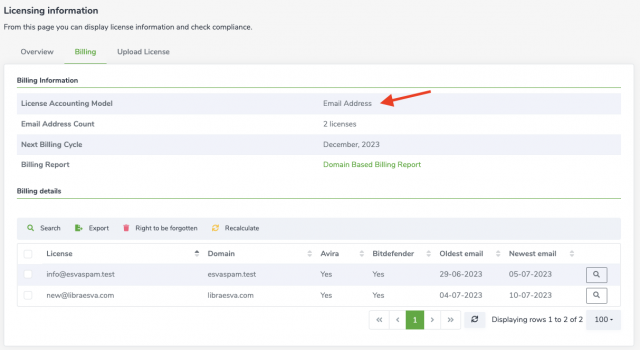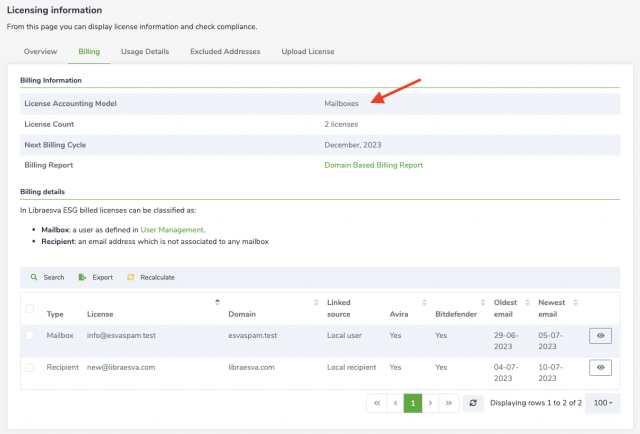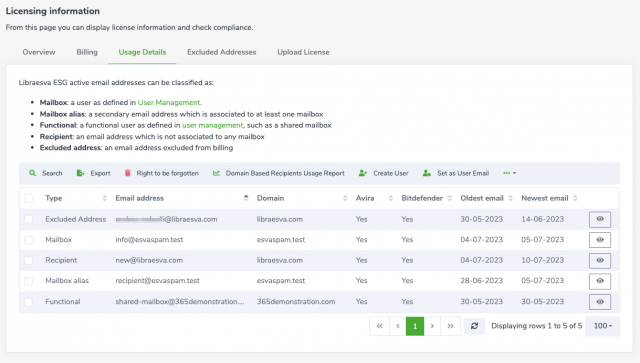Table of Contents
License Accounting Model
Based on your Libraesva ESG license subscription billing is performed based on either Mailbox or Email Address.
The following table helps understanding your license accounting model:
| Libraesva ESG Product | Billing Model |
| Libraesva ESG On Premise | Email Address |
| Libraesva ESG Private Cloud | Email Address |
| Libraesva ESG for Microsoft 365 / GSuite | Mailbox |
| Libraesva ESG for Microsoft 365 / GSuite BYOL | Mailbox |
| Libraesva ESG for MSPs | Mailbox |
You can check your actual License Accounting Model under menù Appliance -> License & Billing.
Email Address Accounting Model
Under this model every active internal email address, which includes all email address that had successfully received (or sent) a scanned email in the last 60 days, counts as a license.
Examples:
- A User with 5 email addresses associated, counts as 5 licenses.
- An email sent to a recipient that is being bounced back from the mailbox server is not counted as a license (no final delivery).
Mailbox Accounting Model
Under this model all email addresses belonging to the same Mailbox count as one single license. Every other active internal email address, not tied to a Mailbox, that had successfully received (or sent) a scanned email counts as an additional license.
Examples:
- A User with 5 email addresses associated, counts as 1 license.
- A recipient that received an email which is not associated to any User counts a license
Understanding your license billing
In the Licence & Billing menu you can see all billing and usage details related to your licence. The Billing section reports the licenses that Libraesva is taking into account for billing, based on your usage and licensing accounting model.
Email Address License Accounting Model
If your license accounting model is “Email Address”, all active email address are listed in the Billing section. No “Usage” section is available as its identical to the Billing one, based on the “per Email Address” license model.
For every listed email address you can see details on the oldest and newest email that has been analysed by the system.
Mailbox License Accounting Model
If your license accounting model is “Mailbox” the Billing section reports only the addresses that count as a license (no aliases or shared mailboxes are reported here as they don’t count as a license).
In this list accounted licenses are classified as:
-
- Mailbox: a user as defined under Authentication -> User Management section
- Recipient: an internal email address that is not associated to any Mailbox
For every entry con can click on the corresponding detail icon on the right side to see Mailbox or Recipient details.
You then have access to the Usage Details section which provides a detailed classification of each active e-mail that has been successfully analysed by your appliance and then aggregated following the “per Mailbox” license model. All email addresses are classified following this schema:
-
- Mailbox: a user as defined in User Management, counts as license
- Mailbox alias: a secondary email address which is associated to at least one mailbox, doesn’t count as license
- Functional: a functional user as defined in User Management, such as a shared mailbox. Doesn’t count as license
- Recipient: an email address which is not associated to any mailbox, counts as license
- Excluded address: an email address excluded from billing. This exception can be created by Libraesva staff only. Doesn’t count as license
For every entry con can click on the corresponding detail icon on the right side to manage it.
How to get a true licence count
As the licensing accounting process reflects your bill, it’s really important that you apply the right Libraesva ESG settings to match a true license count.
The following guidelines are general best practices not only to achieve the correct license count, but more importantly, to get the best performance and security results from your Libraesva installation.
- Configure all relevant backend connectors to sync users
- Setup a Recipient Verification method
- Import Users
Integrations
Libraesva natively integrates with most mailbox servers, including major Cloud Providers like Microsoft 365 and Google. For on premises installations you should configure a LDAP connector, if available. If none of the above works, you should locally add users and aliases either manually or by CSV import.
Recipient Verification
It’s a widely suggested best practice to reject mail addressed to nonexistent recipients at the gateway level. This will improve the threats block rate and keep your license usage count accurate. If you have configured one of the available connectors as described above, this list is usually auto-populated. If not you can add email addresses either manually or by CSV import.
Import Users
This is very important particularly if your License Accounting Model is per Mailbox, which is a User by definition. If you have configured one of the available connectors as described above, this list is usually auto-populated. If not you can add email addresses either manually or by CSV import.
If you have correctly applied the above configuration, you will get a true license count.


